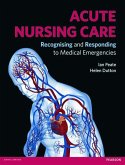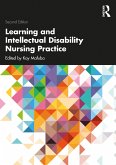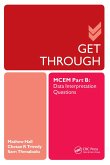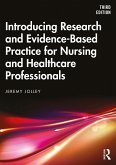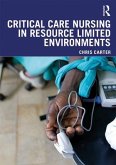Peate Ian, Dutton HelenRecognising and Responding to Medical Emergencies
Acute Nursing Care
Recognising and Responding to Medical Emergencies
Herausgeber: Dutton, Helen; Peate, Ian
Peate Ian, Dutton HelenRecognising and Responding to Medical Emergencies
Acute Nursing Care
Recognising and Responding to Medical Emergencies
Herausgeber: Dutton, Helen; Peate, Ian
- Broschiertes Buch
- Merkliste
- Auf die Merkliste
- Bewerten Bewerten
- Teilen
- Produkt teilen
- Produkterinnerung
- Produkterinnerung
Using a body systems approach and fully updated in light of new NEWS and NMC guidelines, as well as including a new chapter on mental health, the second edition of this book provides a comprehensive overview of the essential issues in acute care.
Andere Kunden interessierten sich auch für
![Acute Nursing Care Acute Nursing Care]() Ian PeateAcute Nursing Care62,99 €
Ian PeateAcute Nursing Care62,99 €![Learning and Intellectual Disability Nursing Practice Learning and Intellectual Disability Nursing Practice]() Kay Mafuba (UK Univ. of West London)Learning and Intellectual Disability Nursing Practice84,99 €
Kay Mafuba (UK Univ. of West London)Learning and Intellectual Disability Nursing Practice84,99 €![Get Through MCEM Part B Get Through MCEM Part B]() Matthew HallGet Through MCEM Part B61,99 €
Matthew HallGet Through MCEM Part B61,99 €![Ethics and the Good Nurse Ethics and the Good Nurse]() Andrew Peterson (UK University of Birmingham)Ethics and the Good Nurse26,99 €
Andrew Peterson (UK University of Birmingham)Ethics and the Good Nurse26,99 €![Ethics and the Good Nurse Ethics and the Good Nurse]() Andrew Peterson (UK University of Birmingham)Ethics and the Good Nurse68,99 €
Andrew Peterson (UK University of Birmingham)Ethics and the Good Nurse68,99 €![Introducing Research and Evidence-Based Practice for Nursing and Healthcare Professionals Introducing Research and Evidence-Based Practice for Nursing and Healthcare Professionals]() Jeremy JolleyIntroducing Research and Evidence-Based Practice for Nursing and Healthcare Professionals55,99 €
Jeremy JolleyIntroducing Research and Evidence-Based Practice for Nursing and Healthcare Professionals55,99 €![Critical Care Nursing in Resource Limited Environments Critical Care Nursing in Resource Limited Environments]() Chris CarterCritical Care Nursing in Resource Limited Environments64,99 €
Chris CarterCritical Care Nursing in Resource Limited Environments64,99 €-
-
-
Using a body systems approach and fully updated in light of new NEWS and NMC guidelines, as well as including a new chapter on mental health, the second edition of this book provides a comprehensive overview of the essential issues in acute care.
Hinweis: Dieser Artikel kann nur an eine deutsche Lieferadresse ausgeliefert werden.
Hinweis: Dieser Artikel kann nur an eine deutsche Lieferadresse ausgeliefert werden.
Produktdetails
- Produktdetails
- Verlag: Taylor & Francis Ltd
- 2 ed
- Seitenzahl: 604
- Erscheinungstermin: 30. November 2020
- Englisch
- Abmessung: 244mm x 170mm x 32mm
- Gewicht: 1188g
- ISBN-13: 9781138352018
- ISBN-10: 1138352012
- Artikelnr.: 59997146
- Herstellerkennzeichnung
- Libri GmbH
- Europaallee 1
- 36244 Bad Hersfeld
- gpsr@libri.de
- Verlag: Taylor & Francis Ltd
- 2 ed
- Seitenzahl: 604
- Erscheinungstermin: 30. November 2020
- Englisch
- Abmessung: 244mm x 170mm x 32mm
- Gewicht: 1188g
- ISBN-13: 9781138352018
- ISBN-10: 1138352012
- Artikelnr.: 59997146
- Herstellerkennzeichnung
- Libri GmbH
- Europaallee 1
- 36244 Bad Hersfeld
- gpsr@libri.de
Ian Peate, OBE FRCN; Visiting Professor of Nursing, St George's University of London and Kingston University, London; Visiting Professor Northumbria University; Visiting Senior Clinical Fellow University of Hertfordshire; Head of School, School of Health Studies, Gibraltar; Editor in Chief, British Journal of Nursing. Ian began his nursing career at Central Middlesex Hospital, becoming an Enrolled Nurse practicing in an intensive care unit. He later undertook three years student nurse training, becoming a Staff Nurse, then a Charge Nurse. He has worked in nurse education since 1989. His key areas of interest are nursing practice and theory. Ian has published widely. He was awarded an OBE in the Queen's 90th Birthday Honours List for his services to Nursing and Nurse Education and was bestowed a Fellowship from the Royal College of Nursing in 2017. Helen Dutton, RGN; ENB100; RNT; BA Nursing Educaiton (Manchester); MSc (London); Senior Fellow of the Higher Education Academy; Senior Lecturer Critical Care, College of Nursing Midwifery and Healthcare, University of West London. Helen completed her RGN at Addenbrooke's Hospital, Cambridge. After gaining experience in medical and surgical nursing she moved to St Thomas' Hospital, London to work in intensive care, then moved to become a Sister in Cardiothoracic Intensive Care at the Royal Brompton and Harefield NHS Trust. Her education career started at the Royal Brompton, then moved on to higher education. She is currently employed as a Senior Lecturer in Critical Care at the University of West London. Helen is course leader for BSc (Hons) Clinical Practice. Intensive and critical care nursing have been her main focus, leading the development of post qualifying critical care courses at the University of West London. She has published in her areas of interest; acute/enhanced/high dependency care, physical examinations skill for health care professionals and the early recognition and treatment of those who are at risk of deterioration.
1.Assessment and recognition of emergencies in acute care 2Vulnerability in
the acutely ill patient 3.Recognising and responding to deterioration in
mental state 4.The cell and tissues 5.Body fluids and electrolytes 6.The
patient with acute respiratory problems 7.The patient with acute
cardiovascular problems 8.Recognition and management of cardiopulmonary
arrest 9.The patient with acute renal problems 10.The patient with acute
neurological problems 11.The patient with acute gastrointestinal problems
12.The patient with acute endocrine problems 13.The immune and lymphatic
systems, infection and sepsis 14.The safe transfer of acutely ill patients
the acutely ill patient 3.Recognising and responding to deterioration in
mental state 4.The cell and tissues 5.Body fluids and electrolytes 6.The
patient with acute respiratory problems 7.The patient with acute
cardiovascular problems 8.Recognition and management of cardiopulmonary
arrest 9.The patient with acute renal problems 10.The patient with acute
neurological problems 11.The patient with acute gastrointestinal problems
12.The patient with acute endocrine problems 13.The immune and lymphatic
systems, infection and sepsis 14.The safe transfer of acutely ill patients
1.Assessment and recognition of emergencies in acute care 2Vulnerability in
the acutely ill patient 3.Recognising and responding to deterioration in
mental state 4.The cell and tissues 5.Body fluids and electrolytes 6.The
patient with acute respiratory problems 7.The patient with acute
cardiovascular problems 8.Recognition and management of cardiopulmonary
arrest 9.The patient with acute renal problems 10.The patient with acute
neurological problems 11.The patient with acute gastrointestinal problems
12.The patient with acute endocrine problems 13.The immune and lymphatic
systems, infection and sepsis 14.The safe transfer of acutely ill patients
the acutely ill patient 3.Recognising and responding to deterioration in
mental state 4.The cell and tissues 5.Body fluids and electrolytes 6.The
patient with acute respiratory problems 7.The patient with acute
cardiovascular problems 8.Recognition and management of cardiopulmonary
arrest 9.The patient with acute renal problems 10.The patient with acute
neurological problems 11.The patient with acute gastrointestinal problems
12.The patient with acute endocrine problems 13.The immune and lymphatic
systems, infection and sepsis 14.The safe transfer of acutely ill patients


